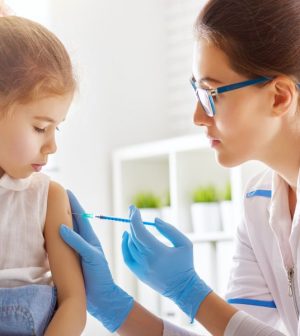- Could Your Grocery Store Meat Be Causing Recurring UTIs?
- Are You Making This Expensive Thermostat Error This Winter?
- Recognizing the Signs of Hypothyroidism
- 10 Strategies to Overcome Insomnia
- Could Artificial Sweeteners Be Aging the Brain Faster?
- Techniques for Soothing Your Nervous System
- Does the Water in Your House Smell Funny? Here’s Why
- Can a Daily Dose of Apple Cider Vinegar Actually Aid Weight Loss?
- 6 Health Beverages That Can Actually Spike Your Blood Sugar
- Treatment Options for Social Anxiety Disorder
When Kids Expect a Needle to Hurt, It Does

When it comes to kids and medical procedures like needles, expectation is everything.
If they think the shot will hurt, it probably will, a new study finds. On the flip side, if they’re coaxed not to expect a lot of pain, they may feel it less.
“We know that expectation affects pain experience in adults; we don’t know whether this is also true for children,” said study author Kalina Michalska, a psychologist at the University of California, Riverside.
In real-life terms, distracting children beforehand has value, the researchers said. For example, telling them, “This is going to feel like a branch scraping against your skin” may be less frightening than saying, “This is going to hurt.”
The study involved 48 children (27 of whom had an anxiety disorder) and 25 adults. Michalska’s team applied heat to the participants and asked them to rate levels of pain as low, medium or high. High was about the temperature of very warm tap water.
The experiment, however, used only one temperature, the one rated as medium. The difference was the cues participants heard before the heat was applied. One tone meant low heat, the other high.
Surprisingly, all three groups had a similar relationship between pain expectation and feeling — for example, if they heard cues for high pain, they reported it, even though the actual pain level was only medium. Michalska’s group had expected the strongest reaction among the anxious children, followed by healthy children, then adults.
“We took great care to reassure children and make them feel comfortable. There were always two experimenters in the room with them and a nurse who saw them before and after to ensure they were OK,” Michalska said in a university news release. “We did not take as great a precaution with adults.”
Despite this reassurance, the study showed that pain expectation significantly affects pain experience, she said.
“What we learn is that both healthy and anxious children’s experience of pain is influenced by what they are told about it. If we tell them they will experience a lot of pain — or they tell themselves this — they will actually experience more pain and greater negative emotions as a consequence,” Michalska said.
The report was published online May 30 in the journal Psychosomatic Medicine.
More information
The American Academy of Pediatrics recommends ways to make vaccines less painful.
Source: HealthDay
Copyright © 2026 HealthDay. All rights reserved.










